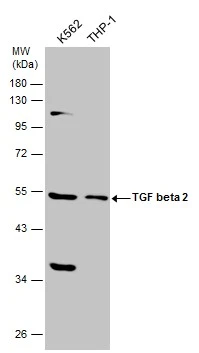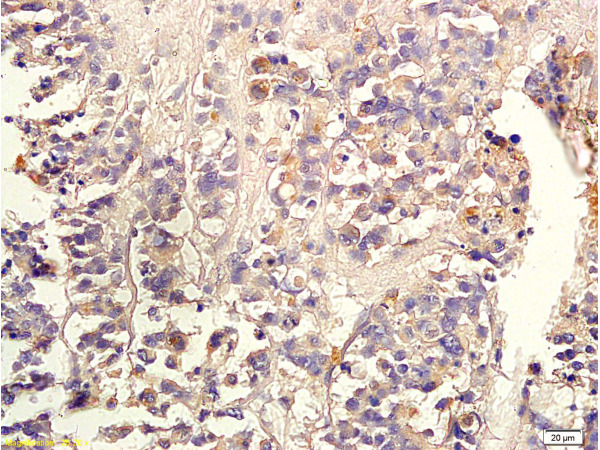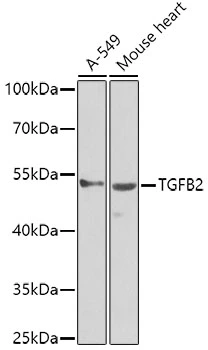
Various whole cell extracts (30 μg) were separated by 10% SDS-PAGE, and the membrane was blotted with TGF beta 2 antibody (GTX132546) diluted at 1:1000.
TGF beta 2 antibody
GTX132546
ApplicationsWestern Blot
Product group Antibodies
ReactivityHuman
TargetTGFB2
Overview
- SupplierGeneTex
- Product NameTGF beta 2 antibody
- Delivery Days Customer9
- Application Supplier NoteWB: 1:500-1:3000. *Optimal dilutions/concentrations should be determined by the researcher.Not tested in other applications.
- ApplicationsWestern Blot
- CertificationResearch Use Only
- ClonalityPolyclonal
- Concentration2.66 mg/ml
- ConjugateUnconjugated
- Gene ID7042
- Target nameTGFB2
- Target descriptiontransforming growth factor beta 2
- Target synonymsCAEND2, G-TSF, LDS4, TGF-beta2, transforming growth factor beta-2 proprotein, BSC-1 cell growth inhibitor, cetermin, glioblastoma-derived T-cell suppressor factor, polyergin, prepro-transforming growth factor beta-2
- HostRabbit
- IsotypeIgG
- Protein IDP61812
- Protein NameTransforming growth factor beta-2 proprotein
- Scientific DescriptionThis gene encodes a member of the transforming growth factor beta (TGFB) family of cytokines, which are multifunctional peptides that regulate proliferation, differentiation, adhesion, migration, and other functions in many cell types by transducing their signal through combinations of transmembrane type I and type II receptors (TGFBR1 and TGFBR2) and their downstream effectors, the SMAD proteins. Disruption of the TGFB/SMAD pathway has been implicated in a variety of human cancers. The encoded protein is secreted and has suppressive effects of interleukin-2 dependent T-cell growth. Translocation t(1;7)(q41;p21) between this gene and HDAC9 is associated with Peters anomaly, a congenital defect of the anterior chamber of the eye. The knockout mice lacking this gene show perinatal mortality and a wide range of developmental, including cardiac, defects. Alternatively spliced transcript variants encoding different isoforms have been identified. [provided by RefSeq]
- ReactivityHuman
- Storage Instruction-20°C or -80°C,2°C to 8°C
- UNSPSC12352203
References
- Park M, Kim JY, Kang JM, et al. PRL-1 overexpressed placenta-derived mesenchymal stem cells suppress adipogenesis in Graves' ophthalmopathy through SREBP2/HMGCR pathway. Stem Cell Res Ther. 2021,12(1):304. doi: 10.1186/s13287-021-02337-2Read this paper
- Park M, Banga JP, Kim GJ, et al. Human placenta-derived mesenchymal stem cells ameliorate orbital adipogenesis in female mice models of Graves' ophthalmopathy. Stem Cell Res Ther. 2019,10(1):246. doi: 10.1186/s13287-019-1348-0Read this paper




![WB analysis of A549 cell lysate (35μg/lane) using GTX16335 TGF beta 2 antibody [220ct16.4.3.1].](https://www.genetex.com/upload/website/prouct_img/normal/GTX16335/GTX16335_1369_WB_w_23060620_968.webp)

